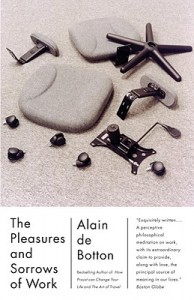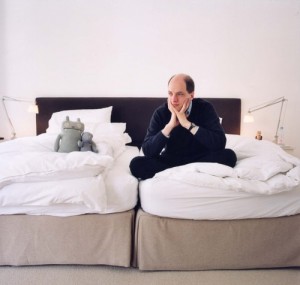 We caught up with our generation’s foremost philosopher and talented author Alain De Botton, to see just why on earth he’s written a (fascinating) book studying people doing what they tend to do for the majority of their adult lives, working.
We caught up with our generation’s foremost philosopher and talented author Alain De Botton, to see just why on earth he’s written a (fascinating) book studying people doing what they tend to do for the majority of their adult lives, working.
So if you’ve ever wondered just how far your tea has travelled or what’s in those big faceless warehouses you go past every-day then The Pleasures and Sorrows of Work is for you, a true work of modern genius that has Proper’s full seal of approval. Anyway here’s the interview…
NS: The Pleasures and Sorrows of work provides a detailed and oft ignored look at a variety of industries and jobs. If things had been different do you think you may have ended up working in any of the particular fields that you studied?
ADB: I would have loved to have been an engineer – and so was especially fascinated by the people designing rockets for the European Space Agency. As a boy, I had the normal run of very boyish interests in machines, which I somehow gave up as an adolescent – but am gradually finding my way back to in middle age.
NS: You chose a real mixed bag of occupations from rocket science to portrait painting, how did you decide which ones to follow and why?
ADB: I wanted to look at jobs that interested me, and also, at jobs that don’t get covered much in the mainstream media. There are endless TV series about doctors and lawyers, none at all about people in logistics. So the project was led by sheer, self-indulgent curiosity. It was a chance for a giant 2 year long job swap.
NS: Were there any jobs that you researched that didn’t make it into the book?
ADB: Quite a few: I researched the life and times of a kebab shop run by a Turkish family. I wanted to look at the idea of serving customers and the joy and sorrow that comes from that.
NS: Were you tempted to look into the world of the unemployed?
ADB: Not for this book, but it’s of course a huge and pertinent subject, never more so than now. But here I was really focused on employment in all its forms.
NS: In the UK we seem to judge people by their career choice more than anything else, why do you think this is?
ADB: It’s not just the UK, it’s the modern way. To be alive in the modern world is always to face the question ‘what do you do?’ What matters above all is what is on our business cards and those who have opted for other paths, who look after elderly relatives, write poetry or nurture forests will be left in no doubt that they have run contrary to the dominant mores of the powerful – and can expect to be marginalised accordingly. Within such a discriminatory framework, workaholism becomes natural. Focusing on one’s career to the exclusion of much else (including greeting neighbours) grows into a sensible necessity, because workplace achievements are the only tokens with which we can secure not only the money we need to survive physically, but also and as importantly the respect that we require to thrive psychologically.
NS: For two years you were continually the ‘new boy in the office’ how did you cope with the constant introductions and rule changes?
ADB: I was highly uncomfortable for 2 years, always feeling shy and the outsider. Looking back, I’m not sure quite how I did it…
NS: You got a bit of stick from book critics for mentioning that the Career Counsellor’s house you stayed in smelled of cabbage. Why do you think they found this to be such an inappropriate observation? There seemed to me to be more than a hint of inverted snobbery aimed at you.
ADB: I genuinely can’t understand it, it seems entirely peculiar. Some people said I respected the people I wrote about too much, others that I was too rude about them. The truth is that I looked at positives and negatives, pleasures and sorrows…
NS: You’re refreshingly frank in berating your critics, has anyone annoyed you lately?
ADB: Yes, myself, my limitations drive me insane.
NS: Do you think there will come a time where the concept of work will disappear and be looked upon in a similar way to how we now view slavery?
ADB: I think the amount of profits that employers take off the back of employees will probably one day be revised. The pay gaps that exist nowadays are truly extraordinary. It’s hard to imagine that a boss might be 4000% per cent better than their lowest employee.
NS: I once worked in a biscuit factory, I managed four days before I started to feel like I was losing my grip on reality and was dreaming about conveyor belts full of penguins (chocolate ones). Did any of your experiences fill you with a similar sense of dread or impending insanity?
ADB: Truthfully, no: I think that writing is a job so filled with its own odd horror that I was glad just to be out of the study and on the road. In some places I worked, I felt a real sadness to leave at the end of the research period.
NS: Speaking of biscuits there are some fascinating facts and figures in quoted in the book, what was your favourite piece of data that you came across?
ADB: I love the idea that all biscuits have genders in the eyes of marketing folk. The jaffa cake is a man, and also one keen on the idea of sport while not actually doing any sport.
NS: Similarly was there anything that you found shocking or disturbing?
ADB: The sheer destructiveness of industry is always shocking: to send one satellite into space costs more than the entire education budget of French Guiana for three years.
NS: The book seems to me to be one that will stand the test of time and provide future reference for those interested in 21st century working life, was this a consideration whilst writing it?
ADB: How generous of you to say this – in general, yes, I do feel that I’m trying to write stuff that will outlive the newspaper or magazines. It seems important to try to find out the essentials, the more timeless aspects.
NS: The book reminded in many ways of the seventies children’s school programme ‘Stop Look Listen’ narrated by Chris Tarrant’s who would succinctly explain the journey of the Cocoa beans to the sweet-shop via the Smarties factory, was this programme in any way an influence on you?
ADB: I never saw the programme, but it’s exactly that kind of programme I loved as a kid and that did influence me. I was a boy in the 70s too and I loved a series called ‘SEE INSIDE A…’ There were ones on oilrigs and trains, planes and power stations. I wanted my book to be an adult version of one of those.
NS: Is modern life rubbish?
ADB: Though there’s little reason for it, I am an optimist – with a tragic take on stuff nevertheless. The great problems with modern life are dislocation, anomie, aimlessness – and prejudice.
NS: We’ve noticed you have quite a cool Ivy League style thing going on, what do you look for when buying clothes and where are you favourite places to buy them?
ADB: I wish! I hate thinking about clothes and buy my entire wardrobe online from the GAP: always the same stuff, year after year. I basically never want to think about my clothes. That said, I’m really into what my wife wears and will happily talk to her about her choices.
NS: Myself and the majority of our readers are pretty obsessive about clothing, are we all on a futile quest for happiness and should we just grow up?
ADB: No, I think outer beauty isn’t superficial, it’s vitally connected to the important things in life. It’s just I’m personally much more interested in architecture and design than clothes, but they’re all quite similar. Surfaces can be deep etc.
NS: As a philosopher, do you find it difficult not to analyse everything you do in your daily life?
ADB: I do analyse everything, but for me, it’s a way to relax and not feel anxiety. I get so anxious if I don’t think alone in a room everyday. Holidays are torture.
NS: You’re a prolific tweeter, do you think Proust et al would have loved the application if they were around today?
ADB: I think he might have done. It’s wonderful to be able to test out ideas and throw stuff out and see what you get back.
NS: To quote Richard Scarry, what do you do all day?
ADB: Sit at home, at the top of the house, and think about stuff. And then mornings and evenings, lots of childcare with 2 very demanding and wonderful young men under 5.
NS: So what’s the next book about?
ADB: About religion, and what an atheist like me can learn from it.
Find out more about Alain here: alaindebotton.com/
..follow his philosophical tweets here: twitter.com/alaindebotton
and buy his ace books here: amazon.com/s/ref=nb_sb_noss?url=search-alias%3Dus-stripbooks-tree&field-keywords=alain+de+botton
Neil Summers

2 Comments
Nice one, adb’s a really nice bloke too
quality.
you can listen to adb and you’ll always come away with something from the experience, no matter what the subject.
Great blog and mag, by the way.